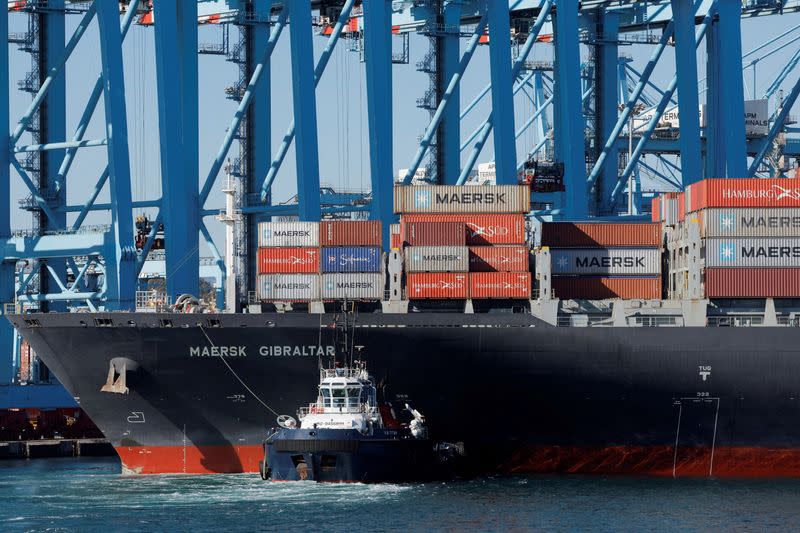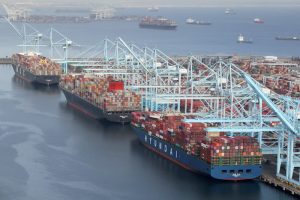The spate of attacks on vessels sailing through the Red Sea by Iran-backed Houthi rebels opposed to Israel’s war on Hamas in Gaza has greatly disrupted the container trade that goes through the Mediterranean and the Suez Canal.
This is the shortest link between Asia and Europe – a key East-West trade route that sees about 12% of global shipping.
The United States announced a 10-nation coalition on Monday that will seek to prevent or deter missile or drone attacks on ships going through the Red Sea.
But the crisis is already having a serious impact on shipping, with many container ships anchored in the Red Sea, while others have turned off tracking systems as traders adjust routes and prices in response to maritime attacks by the Houthi militants from Yemen.
ALSO SEE: Will China Take on More Debt Chasing 5% Growth in 2024?
Attacks in recent days on ships in the Red Sea route have raised the spectre of another prolonged disruption to global trade following major upheaval caused by the Covid pandemic.
Israel’s campaign to eradicate Hamas militants behind an October 7 massacre has left the Gaza enclave in ruins, brought widespread hunger and homelessness, and killed nearly 20,000 people, according to a Palestinian tally.
Under foreign pressure to avoid killing innocents, Israel’s Prime Minister Benjamin Netanyahu says the war will not stop until a remaining 129 hostages are freed and Hamas is obliterated after its fighters’ killed 1,200 Israelis.
US Defence Secretary Lloyd Austin said on Monday the international force in the Red Sea will include vessels and sailors from the United States and the United Kingdom, plus Bahrain, Canada, France, Italy, Netherlands, Norway, Seychelles and Spain.
But with Israel still pounding the shattered Gaza Strip on Tuesday, the pro-Palestinian Houthi movement has vowed to defy the US-led naval force that will patrol waters near Yemen, and keep hitting Israeli targets in the Red Sea.
“Our position will not change in the direction of the Palestinian issue, whether a naval alliance is established or not,” Houthi official Mohammed Abdulsalam told Reuters, saying only Israeli ships or those going to Israel would be targeted.
“Our position in support of Palestine and the Gaza Strip will remain until the end of the siege, the entry of food and medicine, and our support for the oppressed Palestinian people will remain continuous.”
Austin said in Bahrain that joint patrols would be held in the south of the Red Sea and the Gulf of Aden. “This is an international challenge that demands collective action,” he said.
Major shippers to sail around Africa instead
Major shippers including Hapag Lloyd, MSC and Maersk, oil major BP and oil tanker group Frontline have said they will be avoiding the Red Sea route and re-routing via southern Africa’s Cape of Good Hope.
But many ships are still plying the waterway. Several ships underway have armed guards on board, LSEG data showed.
At least 11 container ships which had passed through Suez and were approaching Yemen carrying consumer goods and grains bound for countries including Singapore, Malaysia and the United Arab Emirates, are now anchored in the Red Sea between Sudan and Saudi Arabia, LSEG shiptracking data showed.
Four MSC container ships in the Red Sea have had their transponders turned off since Sunday December 17, the data showed, likely to avoid detection.
Some vessels are attempting to mask their positions by pinging on other locations, as a safety precaution when entering the Yemen coastline, Ioannis Papadimitriou, a senior freight analyst at Vortexa, said.
Denmark’s Maersk paused all container shipments through the Red Sea on Friday following a “near-miss incident” involving its vessel Maersk Gibraltar a day earlier. A number of the ships at anchor in the Red Sea are Maersk vessels, LSEG data showed.
On Tuesday it said vessels previously paused and due to sail through the southern Red Sea and the Gulf of Aden would be rerouted around Africa.
The Houthis, who say they are supporting Palestinians under siege by Israel in the Gaza Strip, have waded into the Israel-Hamas conflict by attacking vessels in vital shipping lanes and even firing drones and missiles at Israel, more than 1,000 miles from the Yemeni capital Sanaa.
Houthis attacked two commercial shipping vessels in the southern Red Sea on Monday.
Insurance and oil costs rising
Industry sources say the impact on global trade will depend on how long the crisis persists, but insurance premiums and longer routes would be immediate burdens.
Vortexa’s Papadimitriou on Tuesday said the price of a Suezmax to carry crude from the Middle East to Europe has risen 25% in a week.
The disruption to energy flows in the Red Sea is unlikely to have large effects on crude and liquefied natural gas (LNG) prices, Goldman Sachs said on Monday, as vessels can be redirected.
“We do estimate that a hypothetical prolonged redirection of all 7 million barrels per day of gross (northbound and southbound) oil flows would raise spot crude prices relative to long-dated prices by $3-4/per barrel,” the investment bank said.
An Asian buyer of naphtha, a petrochemical feedstock imported from Europe, said their vessels were still using the Red Sea route as it would take another 7-14 days to re-route via Cape of Good Hope.
Some oil tanker owners are inserting a new clause to include a Cape of Good Hope option into their shipping contracts as a precautionary measure, shipbrokers said.
A person familiar with Alibaba’s Cainiao logistics arm said they may see slightly longer delivery times and shipping fees, but overall the re-routing would have little impact on business.
- Reuters with additional inputs and editing by Jim Pollard
ALSO SEE:
Freight Firms Avoid Red Sea, Hitting Asia-Europe Supply Chains
Israel Probing Short-Selling Before Hamas Attack – Guardian
Shipping Group Maersk Cuts Growth Outlook on China Curbs
Shipping firms warn of vessel delays amid South China ports Covid surge
Multi billion-dollar Suez jam cleared
Grounded Suez Canal ship puts automotive industry at risk
























